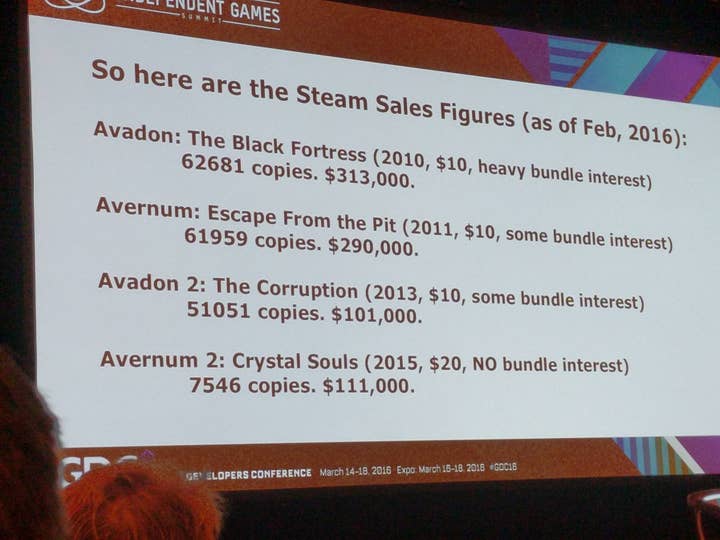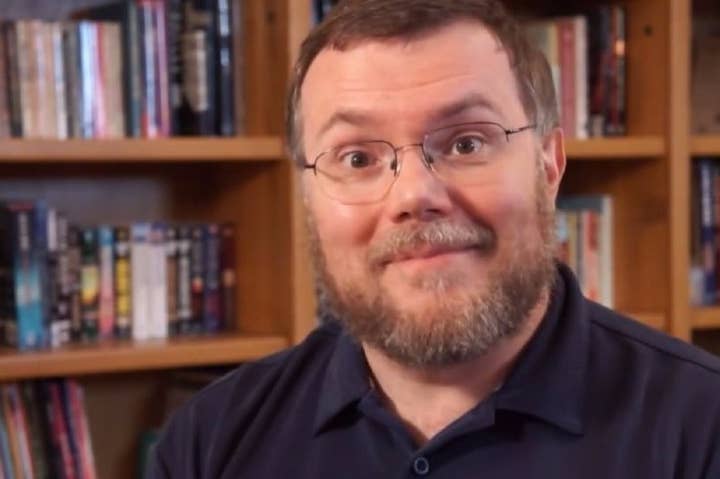"Success should always surprise you. Failure should never surprise you"
Spiderweb Software's Jeff Vogel doesn't believe in an Indiepocalypse - "the games business has always been hard"
The so called "Indiepocalypse" is not the calamity it has been portrayed to be. According to Spiderweb Software's Jeff Vogel, it is more of a market correction, an inevitable return to the tough, competitive conditions he has worked in for more than 20 years.
Speaking at GDC today, Vogel described Spiderweb Software as, "older than the stones and the dirt." In truth, he founded the Seattle-based studio in 1994, and he has been making a similar brand of, "old-school, cheap, retro games," ever since, all of them heavy with text and story, for whatever platforms are most open to his advances.
"Don't be ashamed if you haven't heard of any of them," he said, pointing to a slide showing a list of his work. "I don't write hits. Don't get me wrong, I love hits and I'd love to have one, but I'm in the business of writing respectable niche titles to make a respectable middle-class income."
For the majority of developers, what Vogel has achieved with Spiderweb Software is the ideal: a long career with relatively few creative compromises, making his kind of game for his kind of gamer. However, he also reminded the audience that the latter part of his career has been the kindest.
"It's a tough, competitive business. There was just a time when a lot of people were making a lot of money, and it became possible to forget that"
"As someone who scrambled for individual share of sales on CompuServe back in the 1990s, I can tell you that Steam is a infinite bag of miracles," he said. "People like me who had a back catalogue that went on for days could make far more money than we deserved.
"I will not be using the word, 'Indiepocalypse.' Not because the word is silly, childish and reductive. I like things that are silly childish and reductive. It's just basically inaccurate. There is no apocalypse. Indie games aren't going to go away, because we're awesome and people love what we do. But circumstances change, and we do need to pay attention."
The Indiepocalypse concept will almost certainly be familiar to attendees of an event like GDC: a chain of events kickstarted by the emergence of flexible digital distribution platforms like Steam and Xbox Live, and the emergence of some brilliant, innovative games that galvanised a new generation of developers. Braid and World of Goo made tens of thousands of people believe they could make a game, and so tens of thousands of people did just that. Eventually, Vogel said, the supply surpassed the demand.
"But the supply keeps coming in. You pass the peak and you enter what I believe we have been in for a while now: the recession period, which is a long, gruesome, agonising, bloody process... These are hard realities. There's only a finite amount of money, there's only a finite number of gaming websites with a finite amount of space to put new articles, but the games keep flooding in.
"But there is no apocalypse. Indie games aren't going anywhere... There's just going to be the occasional adjustment and the occasional, necessary shrinkage."
Vogel wasn't on stage just to kill the buzz. He, too, has felt the pressure of this "necessary shrinkage," and he had the slide to prove it.

His last four RPGs, all of them well past any initial rush of sales, describe a clear downward trend in both unit sales and dollars earned. That's despite what Vogel admitted was a broadly similar level of both quality and public reception.
"All my other games on other platforms have followed the same pattern," he continued. "The big lesson from this is that the game business is hard. It's a tough, competitive, miserable, bloodsport kind of business. There was just a time when a lot of people were making a lot of money, and it became possible to forget that fact. But now people have to remember.
"Success should always surprise you. Failure should never surprise you. That's the price you pay for living your dreams. Unfortunately, there are a certain number of people going out of business, and that will continue until life becomes tolerable for those who survive.
"Have a great day kids!"




.jpg?width=291&height=164&fit=crop&quality=80&format=jpg&auto=webp)




